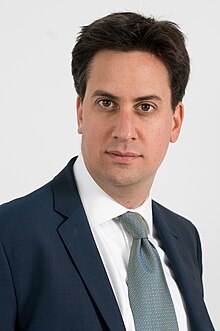Labour grabs poll lead in UK General Election campaign
Friday, April 10, 2015

Image: Department of Energy.
The approval ratings of UK Labour leader Ed Miliband rose above those of his Conservative opponent, David Cameron, for the first time in this year's bitterly fought general election campaign. The poll results showed support for the Labour Party was also rising.
A poll by Panelbase yesterday showed Labour six points ahead; a similar survey by Survation for the Daily Mirror showed Labour four points ahead of the Conservatives. This latter poll was mixed for the Labour leader as it showed only 25% of voters were convinced Miliband was suited to the job of Prime Minister while 37% preferred David Cameron, but it also shows that people preferred Miliband's recent conduct as party leader to Cameron's. A poll by TNS found a three point lead for Labour.
ComRes polling indicated the eventual outcome of the election is too close to call, projecting the Conservatives with 34% of the vote and Labour 33%.
Following the poll results, the Conservative Party fired a volley of negative remarks towards Labour. Defense secretary Michael Fallon said Ed Miliband would end up signing up for "a grubby backstairs deal" with the Scottish National Party (SNP) which would lead to the cancellation or non-renewal of the Trident nuclear submarine programme. The Labour Party have stated they support the continuation of Trident and will not negotiate on Trident with the SNP.
Fallon's comments on Trident were backed up by David Cameron.
The Labour Party counter-claimed a deal between the Conservatives and Liberal Democrats had put the cost of Trident renewal up by £1.4bn.
Miliband responded to Fallon's comments: "Michael Fallon is a decent man, but today I think he has demeaned himself and he has demeaned his office. National security is too important to play politics with and I will never compromise national security."
Former Labour leader Tony Blair said Fallon's remarks hinted at desperation: "The Tories were up to their old tricks in their personal attack on Ed this morning. I remember the 'demon eyes' poster of 1997. It is always a sign of desperation and it will backfire. It shows how nervous they are of a Labour campaign full of confidence, which is showing that it understands the challenges facing working people and how to overcome them. The more they indulge in these tactics the better we should feel."
Liberal Democrat Vince Cable expressed his displeasure at Fallon's remarks, saying it was "an appalling way to conduct the argument".
The two main parties have also proposed a number of new ideas for policy. Labour's Yvette Cooper is to formally announce a new policy today to protect 10,000 police officers' jobs by eliminating elected Police and Crime Commissioners and gun licensing subsidy, and sharing of police back-office services and procurement. The Labour crime and justice manifesto also includes creating a new commission on sexual and domestic violence, banning "legal highs", and reforming prisons to introduce more education and work for prisoners.
Conservative Cameron pre-announced a proposal to change the rules so workers in the public sector and for companies with 250 employees or more — which between the two is estimated to be around half the work force — would be entitled to three days of paid volunteering leave per year. In prepared remarks, Cameron is to call the move represents the "clearest demonstration of the Big Society in action". This marks a return of the language of the 'Big Society' which had slowly disappeared from use since the last election.
Sources
- Emily Godsen. "David Cameron: 15 million workers to get three days' paid volunteering leave each year" — The Telegraph, April 10, 2015
- Alan Travis. "Labour pledges £800m to protect police officer numbers" — The Guardian, April 9, 2015
- Patrick Wintour. "Labour moves ahead of Tories on the day the polls turned" — The Guardian, April 9, 2015
- Patrick Wintour. "Labour accuse Tories of 'grubby deal' with Lib Dems over Trident renewal" — The Guardian, April 9, 2015
- The World at One. "'Appalling way to conduct the argument...need proper argument re #Trident' - @vincecable on Fallon's Miliband attack." — twitter, April 9, 2015

